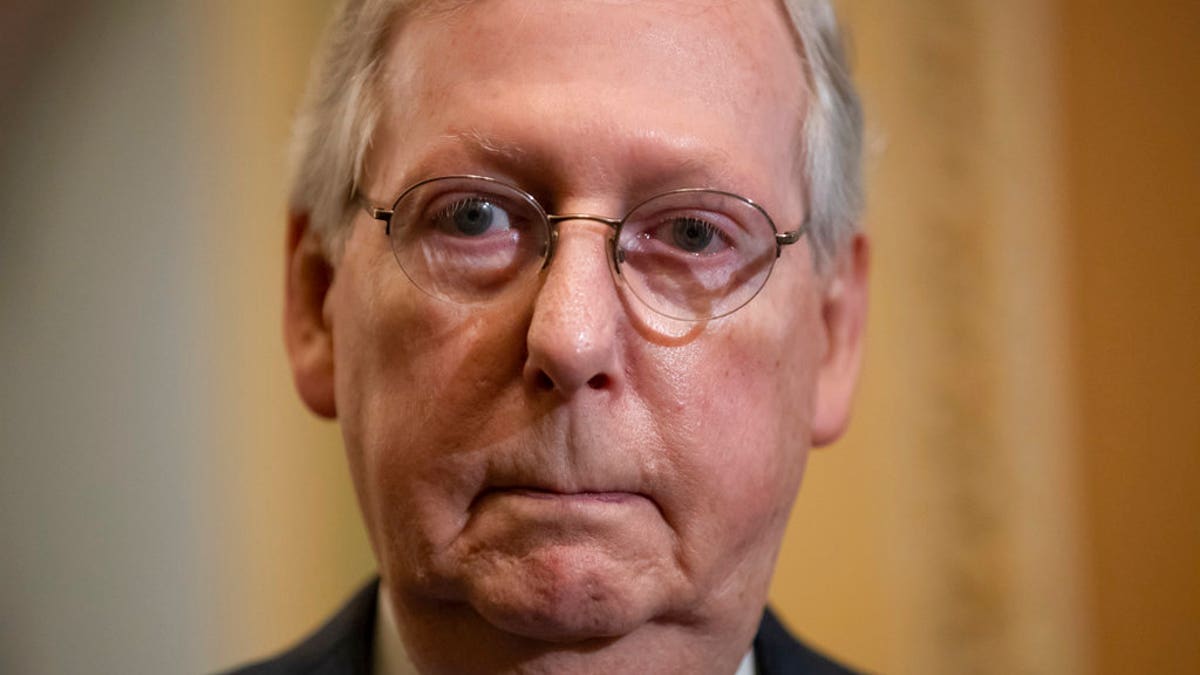
Senate Majority Leader Mitch McConnell, R-Ky., has said there is "zero"chance of a government shutdown Oct. 1. (AP Photo/J. Scott Applewhite, File)
Well, that was fast.
They’re back.
At least some of them.
The Senate returns Wednesday after its abridged “August recess.” Members of the House of Representatives won’t darken the door to the Capitol until Sept. 4. But senators return to Washington following a nearly two-week respite.
This comes after Senate Majority Leader Mitch McConnell, R-Ky., threatened to moor senators in Washington for the entire month of August.
It didn’t quite work out that way. But senators are expected to linger in Washington for the remainder of the month. On tap are a host of nominations which McConnell hopes to confirm. Senators plan to debate and vote on at least two spending measures. One appropriations bill funds the Pentagon for fiscal year 2019. The other bill funds the departments of Labor and Health and Human Services, known in congressional circles as “Labor-H.” Senators will blend those two measures together into a single bill.
This is a big deal. Before its hiatus, the Senate approved seven of the 12 annual spending bills to fund the government next year. Knocking out the military appropriations and Labor-H bill would bring the figure to nine of the 12. In March, President Trump warned he wouldn’t sign another, gigantic “omnibus” spending bill where lawmakers lump the appropriations bills together into a solitary, legislative monster. Trump also implored McConnell to keep the Senate in session this month to hammer out the bills.
There’s another tactic at stake here: the House.
When the House returns in September, its members will have to work with senators to merge the already approved spending bills into a final version to send to the president. The last draft of legislation is called a “conference report.” House conservatives may balk at some of the positions the Senate took on the spending bills. But the clock is ticking toward Sept. 30, the end of the government’s fiscal year. Passing some of the spending bills in August will help the Senate pressure the House to step up in September and avert a standoff with the president over spending and perhaps avoid a government shutdown.
Moving expeditiously through the appropriations bills is an effort by congressional Republicans to quash any government shutdown chatter. GOPers know that a potential shutdown -- threatened by the president over border wall funding – dooms their chances for success in the midterms. Such a scenario reflects chaos and mayhem in Washington. But Trump may continue to tout the prospects of a shutdown, regardless of what happens on Capitol Hill. After all, Trump tweeted “I don’t care what the political ramifications are.” He added that congressional Democrats wouldn’t fix border security and immigration issues “without a Government Shutdown.”
So, the government shutdown narrative will resonate the rest of the month, regardless of what unfolds on the Senate floor.
But much focus this month is on what’s happening behind the scenes.
Sens. Joe Donnelly, D-Ind., and Heidi Heitkamp, D-N.D., become the second and third Democrats to meet with Supreme Court nominee Brett Kavanaugh. Both voted to confirm Supreme Court Justice Neil Gorsuch last year. Donnelly and Heitkamp are also moderate Democrats facing serious re-election challenges this fall. Expect Kavanaugh to continue to make his round-robin appearances on Capitol Hill, huddling with senators ahead of his confirmation hearing Sept. 4.
At the same time, Democrats and Republicans will renew their bickering over papers and documents belonging to Kavanaugh. The National Archives wrote to Sen. Dianne Feinstein, D-Calif., the top Democrat on the Senate Judiciary Committee, rejecting a request for Kavanaugh’s paperwork from his time at the White House under President George W. Bush. Archivist David Ferriero told Feinstein the Archives only complies with requests from committee chairs.
Democrats will contend that an early September hearing for Kavanaugh is rushed, especially without a full compliment of documents. Regardless, the request may take until the end of October to fulfill. It’s now pretty clear that McConnell wants to confirm Kavanaugh before the Supreme Court’s term starts on Oct. 1.
Ironically, much of the conversation on Capitol Hill for the rest of the month won’t have much to do with what happens at the Capitol.
Senators of both of parties, especially those facing competitive re-election bids, will keep one eye on the flight schedule as they attempt to get back home to campaign as much as possible.
Discussion about the midterm elections will dominate as both sides eye polls and campaign war chests ahead of the home stretch.
Reporters will dog senators in the corridors over the latest tweets by the president or a variety of foreign policy issues, ranging from trade tariffs to Iran to Syria to North Korea. There will be conversations about comments by former White House aide Omarosa Manigault Newman.
Republicans may continue to tout their tax reform bill this month. But the federal government ran a $77 billion deficit in July. That’s up 79 percent from a year ago. Turns out that federal receipts dropped 3 percent in July. That means the federal government collected a lot less than a year ago. Interest payments on the debt spiked a staggering 41 percent in July. Tax reform advocates argue that the tax bill will eventually mitigate some of those losses and shrink federal deficits. But the Congressional Budget Office (CBO) estimates the deficit for the entire year will clock in about 19 percent more than last year.
And then, there’s what’s going down in a federal courthouse just across the river in Alexandria, Va. A jury will determine the fate of former Trump campaign manager Paul Manafort in the near future. Manafort’s fate, innocent or guilty, will send shockwaves across Capitol Hill. Some lawmakers will be more than happy to comment on the verdict – depending on how it goes. Others will sprint from the press – depending on how it goes.
No wonder the House doesn’t want to be here in August.
Capitol Attitude is a weekly column written by members of the Fox News Capitol Hill team. Their articles take you inside the halls of Congress, and cover the spectrum of policy issues being introduced, debated and voted on there.




